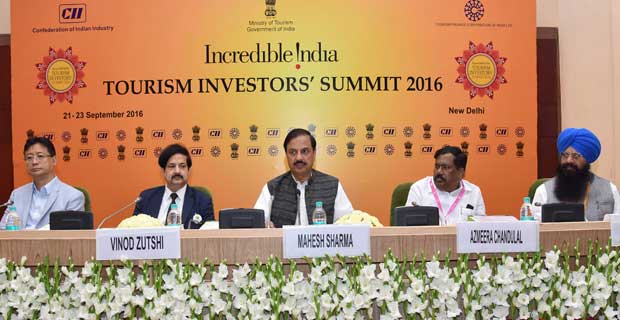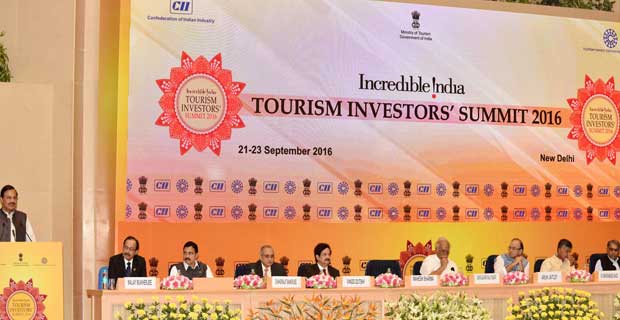Sponsored Listings:
Jaitley in his inaugural address said that a business model should be developed for promoting hospitality industry which has to adjust to the capacity of the market. Railways infrastructure and passenger amenities have also improved and railway stations will be developed at par with airports.
Naidu in his special address expressed his concern that many small countries attract more tourists whereas India could not do so. P K Sinha emphasised on the need of safety and security of tourists.
Four Knowledge Partners- Ernst & Young, KPMG, Yes Bank and Invest India assisted States and UTs for identifying projects, suggesting Tourism Policy updates and presenting these to the potential investors during the summit.
Government is addressing Cleanliness, Connectivity and Security to boost tourism: Dr Mahesh Sharma

Building on India’s intrinsic strengths, the government is addressing cleanliness, connectivity and security to boost tourism, said Dr Mahesh Sharma. He was speaking at the Plenary Session on ‘Why Invest in Incredible India?’ at the IITIS 2016. Dr Sharma emphasised that India should be a destination of choice for tourism, given its cultural and geographic diversity and culture of warm hospitality.
Colonel Rajyavardhan Singh Rathore, Minister of State for Information and Broadcasting, said, “To make filming in India easy, the Ministry has set up the Film Facilitation Office as a single window for all clearances and approvals. This should be replicated in the States.”
Amitabh Kant, CEO, Niti Ayog, highlighted digitisation and urbanisation as huge opportunities for tourism in India. He emphasised that future travellers would come from emerging economies such as India, China and Brazil and India can cater to such tourists through the right facilities.
Nakul Anand, Executive Director, ITC, stressed on the importance of having a friendly tax regime and cited examples of countries which have seen massive tourist inflows because of lower taxes. Dr Naushad Forbes, President, CII and Co-Chairman, Forbes Marshall, said industry and government need to work together to ensure greater tourist traffic to India.
National Civil Aviation Policy to boost tourism: Civil Aviation Minister
Ashok Gajapathi Raju Pusapati, Minister of Civil Aviation has said that the government has taken a number of initiatives to make tourism affordable and accessible to the international traveller. He was speaking at the Plenary Session on ‘Core Infrastructure for Tourism’ at the IITIS 2016.
The National Civil Aviation Policy takes an integrated approach to address the problem of air connectivity across regions and states. Further, the government is working towards an open sky policy with SAARC, addressing issues related to enhancing skill development and increasing the domestic MRO, said the Civil Aviation Minister.
The government is committed to realising the dream of lifting India’s share of tourism from less than one percent at present to at least two percent by 2025 as envisioned by our Prime Minister, stated Dr Mahesh Sharma.
Sanjay Mitra, Secretary, Ministry of Road Transport and Highways, dwelt on issues such as development of roads and infrastructure for variegated tourist circuits and invited the private sector to invest in tourist infrastructure in a big way. Mohammad Jamshed, Member Traffic, Rail Board, said that the Railways has introduced e-ticketing through international debt and credit cards since July this year and is offering rail passes.
Regular Conclave of State Tourism Ministers planned to catalyse tourism development

Building on the IITIS 2016, a regular Conclave of State Tourism Ministers is planned, according to Dr Mahesh Sharma. He was participating in a Panel of Tourism Ministers from the states of Nagaland, Punjab and Telangana on the third day of Summit. Dr Sharma stated that the government would shortly come out with a plan for disinvestment of hotels under Indian Tourism Development Corporation (ITDC).
Sohan Singh Thandal, Minister for Tourism and Cultural Affairs, Government of Punjab, highlighted Punjab’s potential for religious tourism and sites relating to India’s freedom struggle. He stated that funding is required for completing incomplete tourism projects.
Azmeera Chandulal, Minister for Tourism and Culture, Government of Telangana, spoke about the advantages of Hyderabad as an attractive destination. He outlined the target of attracting one million tourists by 2020.
C Apok Jamir, Parliamentary Secretary for Tourism, Nagaland, lauded the Central Government’s emphasis on development of the North East, which he felt would help bridge the ‘emotional gap’ and create a sense of oneness and belonging.
Tourism Investment Summit to be held annually

IITIS 2016 came to a resounding close with several announcements being made to promote investments:
– Institutionalisation of IITIS to be held annually with the next summit to be organised in September 2017
– Setting up of a Task Force headed by Secretary, Tourism, with membership from relevant ministries, state governments and industry associations to undertake strategic planning
– Setting up of an Investor Facilitation Desk to handhold investors and facilitate projects
– Organising Investor Meets in states with the support of MoT
Vinod Zutshi informed that many MoUs were exchanged during the session and many more are in the pipeline.
Cecile Fruman, Global Director, Trade and Competitiveness, World Bank, said, “The World Bank is supporting India’s Buddhist Circuit development and will provide support for Sustainable Tourism development including through funds.”
Chandrajit Banerjee, Director General, CII, said that IITIS 2016 had the participation of 29 States and UTs and about 3000 delegates attended. About 700 investible projects were offered and 16 special state sessions were held.
Source: travelnewsdigest.in










